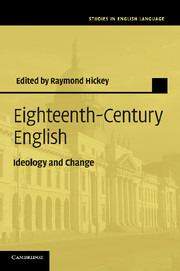Book contents
- Frontmatter
- Contents
- List of figures
- List of maps
- List of tables
- Notes on contributors
- Preface
- 1 Attitudes and concerns in eighteenth-century English
- 2 Prescriptivism and the suppression of variation
- 3 Women's grammars
- 4 Eighteenth-century women and their norms of correctness
- 5 Lowth as an icon of prescriptivism
- 6 Queeney Thrale and the teaching of English grammar
- 7 Coalitions, networks, and discourse communities in Augustan England: The Spectator and the early eighteenth-century essay
- 8 Contextualising eighteenth-century politeness: social distinction and metaphorical levelling
- 9 Expressive speech acts and politeness in eighteenth-century English
- 10 Variation and change in eighteenth-century English
- 11 Variation in sentential complements in eighteenth- and nineteenth-century English: a processing-based explanation
- 12 Nationality and standardisation in eighteenth-century Scotland
- 13 English in eighteenth-century Ireland
- 14 Changes and continuities in dialect grammar
- 15 ‘Be pleased to report expressly’: the development of a public style in Late Modern English business and official correspondence
- 16 Registering the language – dictionaries, diction and the art of elocution
- Timeline for the eighteenth century
- References
- Late modern English language studies
- Indexes
11 - Variation in sentential complements in eighteenth- and nineteenth-century English: a processing-based explanation
Published online by Cambridge University Press: 06 December 2010
- Frontmatter
- Contents
- List of figures
- List of maps
- List of tables
- Notes on contributors
- Preface
- 1 Attitudes and concerns in eighteenth-century English
- 2 Prescriptivism and the suppression of variation
- 3 Women's grammars
- 4 Eighteenth-century women and their norms of correctness
- 5 Lowth as an icon of prescriptivism
- 6 Queeney Thrale and the teaching of English grammar
- 7 Coalitions, networks, and discourse communities in Augustan England: The Spectator and the early eighteenth-century essay
- 8 Contextualising eighteenth-century politeness: social distinction and metaphorical levelling
- 9 Expressive speech acts and politeness in eighteenth-century English
- 10 Variation and change in eighteenth-century English
- 11 Variation in sentential complements in eighteenth- and nineteenth-century English: a processing-based explanation
- 12 Nationality and standardisation in eighteenth-century Scotland
- 13 English in eighteenth-century Ireland
- 14 Changes and continuities in dialect grammar
- 15 ‘Be pleased to report expressly’: the development of a public style in Late Modern English business and official correspondence
- 16 Registering the language – dictionaries, diction and the art of elocution
- Timeline for the eighteenth century
- References
- Late modern English language studies
- Indexes
Summary
Introduction
Sentential complementation, that is the situation that arises when a subordinate clause functions as an argument with respect to a governing element or head, as in ‘I think that she will arrive tomorrow’ or ‘Calling the police would be a mistake’, has been a prolific area of research for many years among English historical and non-historical linguists; see, among many others, Warner (1982), Fischer (1989), Mair (1990, 2006: 119–40), Duffley (1992, 2003, 2006), Fanego (1992, 1996a, 1996b, 1996c, 1997, 2004a, 2004b, 2007), Rohdenburg (1995, 2006), Los (2005), Rudanko (1998, 1999, 2000), Miller (2002), Vosberg (2006), and De Smet (2007). Yet there are still many aspects of the complicated system of English sentential complements that have not been documented and analysed in detail, especially as regards developments since about 1700. In what follows, therefore, I propose to look at some of the changes affecting complement clauses in Late Modern English (1700–1900), and to interpret them in the light of the processing principles formulated by John A. Hawkins in his research on performance preferences in language (Hawkins 1994, 2004).
The chapter is organised as follows. Section 2 contains a brief account of the corpora used in this investigation. Section 3 outlines Hawkins's performance-based theory. Section 4 gives an overview of English sentential complements and summarises their development since Old English times (700–1100), with particular reference to the competition between infinitival and gerundive clauses in modern times.
- Type
- Chapter
- Information
- Eighteenth-Century EnglishIdeology and Change, pp. 200 - 220Publisher: Cambridge University PressPrint publication year: 2010
- 6
- Cited by



